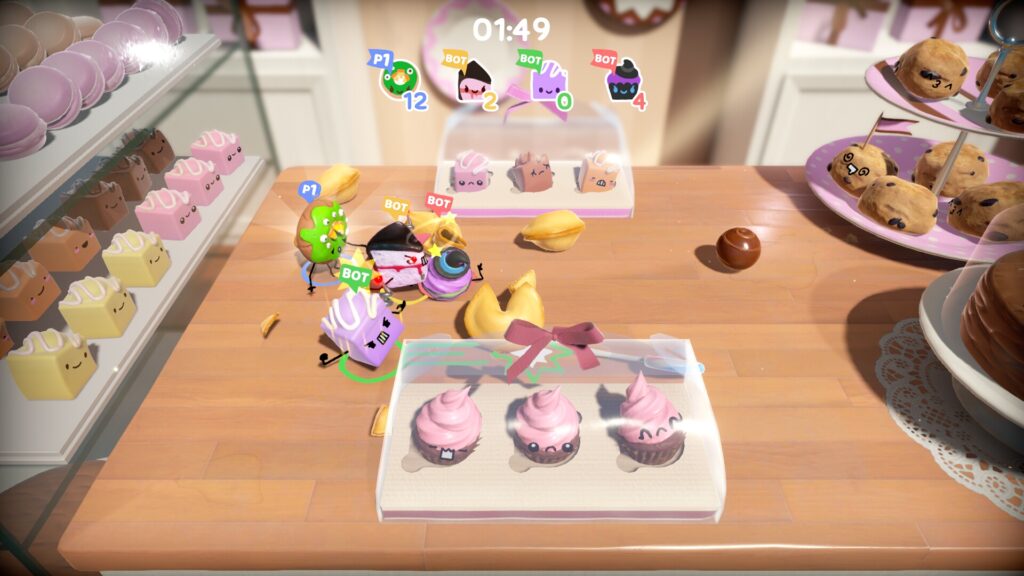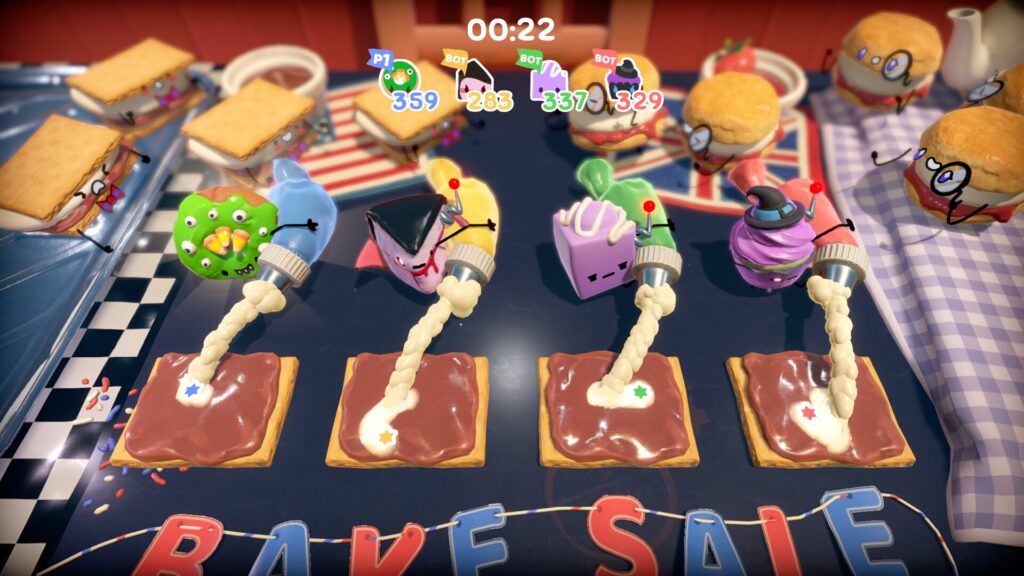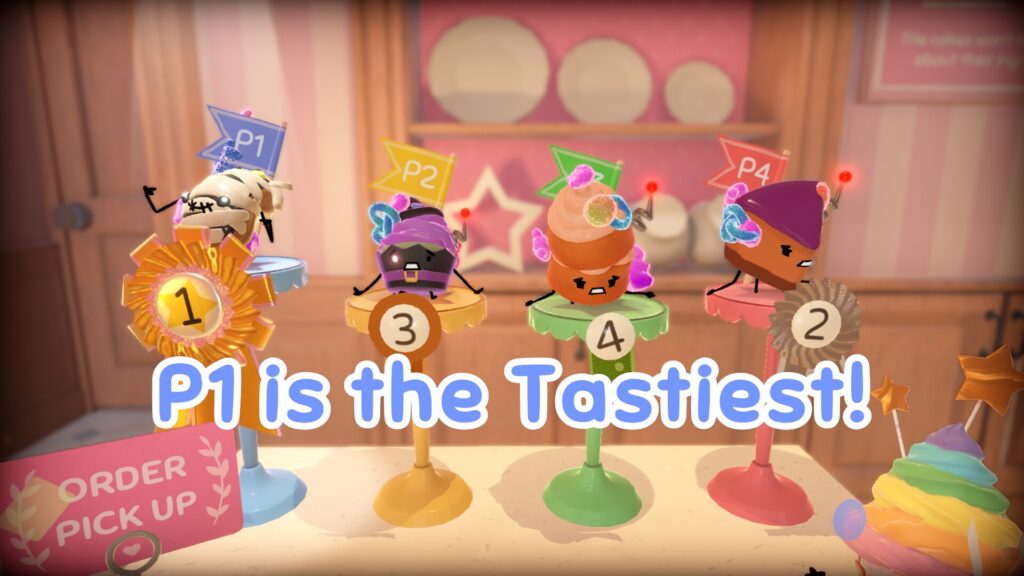As Stadia enters its final weeks before it descends into the Google Graveyard, I’ve been looking around for short, entertaining games that played to its strengths as a true “play anywhere” platform. I’ve bounced around a number of titles across a variety of genres. I tried driving games like Wreckfest and Hot Wheels Unleashed; turn-based games like Worms W. M. D., and even started a replay of Final Fantasy XV, the game that I had considered to be a personal Holy Grail of Portable Gaming: a fully-featured, high-fidelity, modern Final Fantasy game that could be picked up at any time. Though it’s arguably the simplest game on the list and one that barely takes advantage of the horsepower that Stadia (or anything more powerful than a mobile phone, really) has to offer, Cake Bash fell into my queue in a similar fashion.
Cake Bash markets itself as a party brawler in the style of Super Smash Bros. or Multiversus, but it bears a closer resemblance to something like a Mario Party minigame collection. Four players meet on a variety of single-screen battlefields to complete an objective and hinder their opponents’ own progress. Performance in each battle earns coins, which can be used to buy decorative candy, which can be combined with other candy for points, the totals of which will all be compared at the end of a short tournament ladder. I’m not sure if that’s a straight-up improvement over a standard “whoever has the most points wins” achievement structure, but since a maximum of only three candies are available for purchase at once, it affords you one final opportunity to block your opponent from their ideal bedazzle.

“Cake Bash” events are the meatiest (cakiest?) part of the tournament. Competitors are free to roam around the entire arena – pastry friendly locations like a bake shop, patio, beach… and factory, for some reason – for two minutes of nonsense. Objectives are all on brand and include smashing fortune cookies, hoarding jelly beans, or carrying a sparkler in the vein of Capture the Flag or King of the Hill. You don’t have many special moves in your arsenal, but it’s enough to easily derail whatever your opponent is trying to accomplish. You have a limited number of dashes that are useful for escaping hazards or creating dashes, and the recharge rate is slow enough to encourage conservation. You have a simple smack attack that’s enough to make your opponent drop whatever they are carrying, and you have the option of charging it up for a multi-second stun. I found using the charge move awkward, but your character can also throw debris at your opponent for similar effect; extremely satisfying, and the reason why the “throw berries in a pie crust” event ended up being my favorite.
An actual brawl event with health bars and knockouts is conspicuously missing, though with so few attack moves and only five arenas, it’s not clear how entertaining it would have actually turned out.
On the other side of the crust, we have a multitude of “Snack” events. Snack events are quicker, simpler, and more randomized than Cake Bashes. Some events – like Neapolitan, which has the pastries running around stacking falling scoops on an ice cream cone – let the competitors roam around the arena, albeit without their usual combat abilities. Others – like Bake Sale- plant your pastry in place and focus more on timing or pattern recognition. Snack events are likely a lot of fun when played with three other pastry-minded friends, but they’re a serious annoyance when playing with bots, whose timing and precision are blatantly unfair. Campfire wins the Golden Turd award in this regard. While your automated opponents will have no problem shoving GBD roasted marshmallows in their gullet, it’s several degrees of frustrating for a human, a fact probably compounded by Stadia’s inherent latency.

Is it fair to knock a game’s single player mode when it’s clearly designed around multiplayer shenanigans? Possibly, but with so much of the game’s content – arenas, events, characters, etc. – locked at the onset, multiple rapid playthroughs against bots is the most efficient way to peel back the layers of the game, meaning you’re going to spend a lot of time turning marshmallows into charcoal briquets. While there are a decent number of Snack events to help you avoid the frustrating ones, the rest of the game’s content is fairly light. There are only five arenas and five Cake Bash events to unlock, with the rest of the in-game awards being new types of decorative candy and reskins for each of the pastry characters.
Each of the pastries differ in appearance only, as far as I can tell, and they all control like the player is wearing an oversized donut mascot costume. Bodies are weighty, turning is sluggish, and attacks manage to feel wimpy, despite the candies that fly everywhere when you manage to connect one. There’s also something about the radio of character sizes to that of the arena, making me wish there was a bit more room to roam around without bumping into an opposing donut or a hazard. It could be argued, however, that the game mechanics are clumsy to match the game’s cutesy, cartoon aesthetic, which never wavers. Graphics are glossy and crisp, and while there is the occasional performance hiccup, they’re perfectly suited to the on-screen mayhem.
There is no shortage of silly, four-player multiplayer party games on any of the digital marketplaces out there. Cake Bash is far from being the best one, and at $20 per license, you could easily pick up a game with snappier gameplay and a larger community. That said, especially if you manage to score a discount, there are a handful of good minigames here that warrant a pick-up, especially if you’re looking for something that doesn’t lean too hard into competitive mechanics or meme-heavy humor. A single “Get Tasty!” tournament can be completed in 30 minutes or less, so it was well-suited for Stadia’s “play anywhere” mindset. As for me, after a few exploratory playthroughs, I think I’ll need to diet a bit before I pick it up again.





